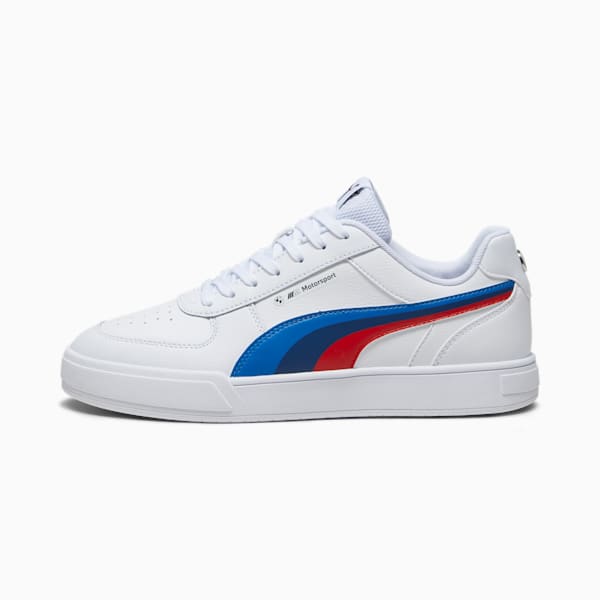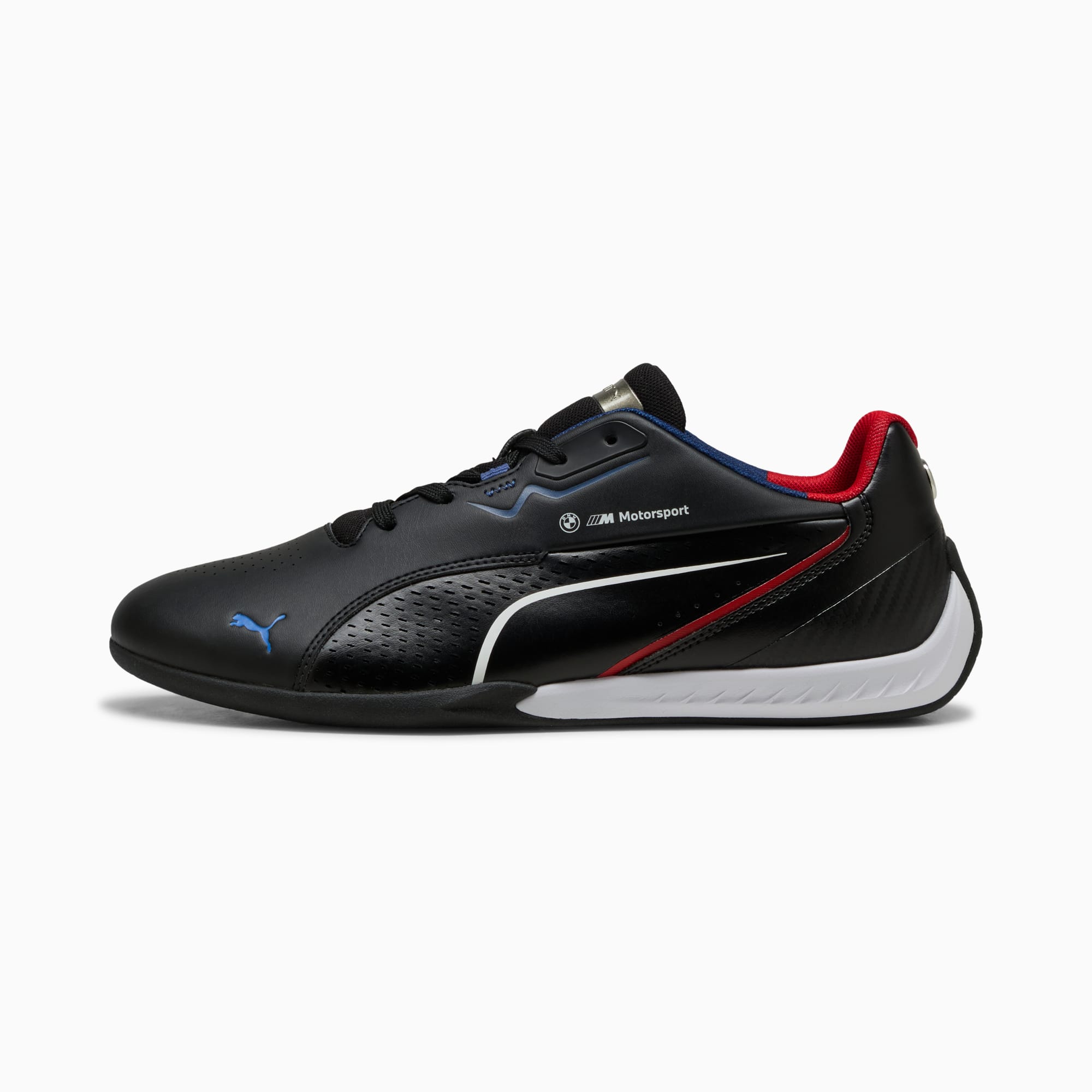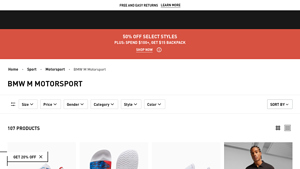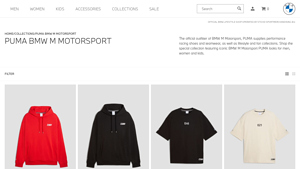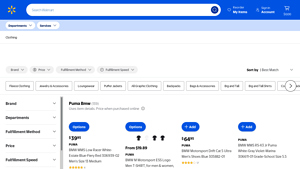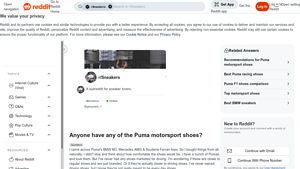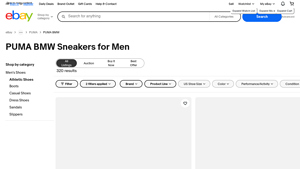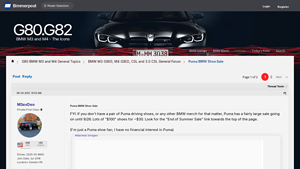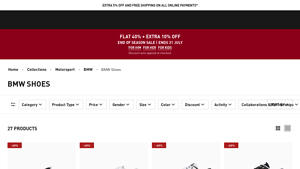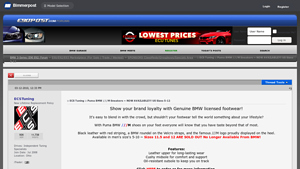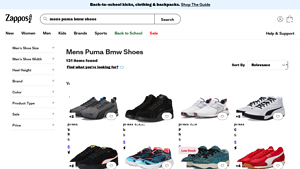Puma Bmw Shoes Guide: Type,Cost,Material…
Introduction: Navigating the Global Market for puma bmw shoes
In today’s competitive landscape, sourcing PUMA BMW shoes presents a unique challenge for international B2B buyers seeking quality and style. As the collaboration between PUMA and BMW M Motorsport continues to gain traction, understanding the nuances of this product category becomes essential. This guide delves into various aspects of PUMA BMW shoes, offering insights into product types, applications, supplier vetting processes, and pricing strategies.
Navigating the global market for these high-performance footwear options can be daunting, especially for buyers from diverse regions like Africa, South America, the Middle East, and Europe, including countries such as Vietnam and Germany. With a plethora of choices available, decision-makers must be equipped with the knowledge to make informed purchasing decisions.
This comprehensive guide empowers B2B buyers by providing a thorough analysis of the PUMA BMW shoe offerings, highlighting the latest trends and innovations in design and performance. By understanding the features that distinguish these shoes in the marketplace, buyers can confidently select products that not only meet their quality standards but also resonate with their target audience. Ultimately, this resource aims to streamline the procurement process, enhance supplier relationships, and drive successful business outcomes in the footwear sector.
Understanding puma bmw shoes Types and Variations
| Type Name | Key Distinguishing Features | Primary B2B Applications | Brief Pros & Cons for Buyers |
|---|---|---|---|
| BMW M Motorsport Sneakers | Sporty design, lightweight materials, BMW branding | Retail, promotional events, motorsport teams | Pros: Stylish, versatile for casual wear. Cons: Limited to specific demographics. |
| BMW M Motorsport Racing Shoes | Performance-focused, durable construction, enhanced grip | Professional racing, motorsport sponsorships | Pros: High-performance, excellent traction. Cons: Higher price point. |
| BMW M Motorsport Lifestyle Shoes | Casual aesthetic, comfort-driven design, diverse color options | Retail fashion, everyday use | Pros: Comfortable for daily wear. Cons: May lack technical features for sports. |
| BMW M Motorsport Slides | Easy-to-wear design, lightweight, ideal for casual settings | Leisurewear, casual retail | Pros: Convenient, affordable. Cons: Less suitable for formal occasions. |
| BMW M Motorsport Limited Editions | Unique designs, often collectible, tied to special events or models | Exclusive retail, marketing campaigns | Pros: High resale value, brand prestige. Cons: Limited availability, higher cost. |
What Are the Key Characteristics of BMW M Motorsport Sneakers?
BMW M Motorsport Sneakers are designed with a sporty aesthetic that appeals to both motorsport enthusiasts and casual wearers. They typically feature lightweight materials, making them suitable for everyday wear while showcasing the iconic BMW branding. B2B buyers should consider their versatility, as these sneakers can be marketed across various segments, including retail and promotional events. However, their appeal may be limited to specific demographics, which could affect inventory turnover.
How Do BMW M Motorsport Racing Shoes Differ in Performance?
Racing shoes from the BMW M Motorsport line are engineered for performance, featuring durable construction and enhanced grip suitable for track use. These shoes are ideal for professional racing and motorsport sponsorships, where safety and performance are paramount. B2B buyers should focus on the technical specifications, as these shoes often come at a higher price point but deliver superior traction and support. Their investment can pay off in terms of brand association with high-performance motorsport.
What Makes BMW M Motorsport Lifestyle Shoes Suitable for Everyday Use?
The Lifestyle Shoes from the BMW M Motorsport collection blend a casual aesthetic with comfort-driven design, making them ideal for everyday use. They come in diverse color options, catering to a broad audience. B2B buyers in the retail fashion sector can leverage these shoes for their appeal in casual environments, promoting them as stylish yet comfortable footwear. However, they may lack some technical features found in racing shoes, which could limit their market to non-sporting consumers.
Why Are BMW M Motorsport Slides Popular for Leisurewear?
BMW M Motorsport Slides are designed for convenience and comfort, making them a popular choice for leisurewear. Their lightweight and easy-to-wear design appeals to consumers looking for casual footwear options. B2B buyers can target leisure and casual retail markets effectively with these slides. While they are affordable and convenient, they may not be suitable for formal or professional settings, which could limit their application in more upscale retail environments.
What Are the Advantages of Investing in BMW M Motorsport Limited Editions?
Limited edition BMW M Motorsport shoes often feature unique designs tied to special events or models, making them highly collectible. These shoes can enhance brand prestige and provide high resale value, appealing to collectors and enthusiasts alike. B2B buyers should consider marketing these exclusive offerings in retail environments that cater to collectors or during marketing campaigns. However, their limited availability can pose a challenge, as they may come with a higher cost, impacting broader consumer access.
Key Industrial Applications of puma bmw shoes
| Industry/Sector | Specific Application of puma bmw shoes | Value/Benefit for the Business | Key Sourcing Considerations for this Application |
|---|---|---|---|
| Motorsport & Racing | Official team footwear for racing events | Enhances brand visibility and team performance | Quality assurance, compliance with racing standards |
| Automotive Retail | Promotional merchandise for BMW dealerships | Drives sales and customer engagement | Licensing agreements, inventory management |
| Fashion & Lifestyle | Trend-driven footwear for urban fashion retail | Appeals to a young, fashion-conscious demographic | Market trends, seasonal collections |
| Event Sponsorship | Merchandise for motorsport events and exhibitions | Strengthens brand association with high-profile events | Logistics, distribution channels |
| Corporate Partnerships | Employee uniforms for automotive industry companies | Promotes corporate identity and team cohesion | Bulk purchasing, customization options |
How Are Puma BMW Shoes Used in the Motorsport Industry?
Puma BMW shoes are utilized as official team footwear in the motorsport sector, particularly during racing events. These shoes are designed to meet the rigorous demands of performance, offering features such as superior grip, comfort, and durability. For international B2B buyers, especially from regions like Europe and the Middle East, it is crucial to ensure that the shoes comply with specific racing standards and regulations. Additionally, sourcing high-quality materials can enhance the overall performance and safety of the footwear.
What Role Do Puma BMW Shoes Play in Automotive Retail?
In automotive retail, Puma BMW shoes serve as promotional merchandise for BMW dealerships. By offering these branded shoes, dealerships can enhance customer engagement and drive sales, particularly among younger demographics who value brand association with luxury and performance. Buyers should consider licensing agreements and inventory management practices to ensure a steady supply of these in-demand products, especially in markets across Africa and South America where brand loyalty is crucial.
How Do Puma BMW Shoes Fit into Fashion and Lifestyle Markets?
Puma BMW shoes are increasingly popular in the fashion and lifestyle sectors, appealing to consumers looking for trendy, sporty footwear. Retailers can leverage these shoes to attract a young, fashion-conscious audience, particularly in urban environments. International B2B buyers should focus on market trends and seasonal collections to ensure they stock the latest designs that resonate with consumers, particularly in competitive markets like Germany and Vietnam.
How Are Puma BMW Shoes Used in Event Sponsorship?
In the context of event sponsorship, Puma BMW shoes are often sold as merchandise at motorsport events and exhibitions. This application helps strengthen brand associations with high-profile events, enhancing visibility and customer loyalty. Buyers should pay attention to logistics and distribution channels to effectively manage inventory during peak event seasons, ensuring that they can meet demand without overextending resources.
Why Are Puma BMW Shoes Important for Corporate Partnerships?
For automotive companies, Puma BMW shoes can serve as part of employee uniforms, promoting corporate identity and fostering team cohesion. This application is particularly valuable for businesses looking to enhance their brand image and create a unified look at events and in the workplace. B2B buyers should consider bulk purchasing options and customization capabilities to align the footwear with their corporate branding strategies effectively.
3 Common User Pain Points for ‘puma bmw shoes’ & Their Solutions
Scenario 1: Sourcing Authentic Puma BMW Shoes for Resale
The Problem: B2B buyers in Africa and South America often face challenges when trying to source authentic Puma BMW shoes for resale. The market is rife with counterfeit products, and distinguishing genuine items from fakes can be daunting. This not only risks financial loss but also damages brand reputation when customers receive subpar products.
The Solution: To ensure the authenticity of Puma BMW shoes, B2B buyers should establish relationships with authorized distributors or directly with Puma’s official channels. This can include engaging with PUMA’s corporate sales team or using verified online platforms that guarantee product authenticity. Additionally, buyers should request documentation or certification of authenticity when placing bulk orders. It’s advisable to conduct quality checks upon receipt and maintain a direct line of communication with suppliers to address any discrepancies immediately. Implementing a robust inventory management system can also help track the sourcing of products and ensure that only authentic items are sold.
Scenario 2: Managing Inventory and Demand Fluctuations
The Problem: International buyers often encounter difficulties in managing inventory levels for Puma BMW shoes due to fluctuating demand. This is particularly challenging in regions where trends can change rapidly, leading to either overstock or stockouts. Overstocking can lead to increased holding costs, while stockouts can result in lost sales opportunities and dissatisfied customers.
The Solution: To effectively manage inventory, B2B buyers should utilize data analytics tools that forecast demand based on market trends, historical sales data, and seasonal patterns. Implementing a Just-In-Time (JIT) inventory system can help minimize holding costs by synchronizing orders with production schedules. Additionally, establishing a flexible supply chain that allows for quick reordering and shorter lead times can help respond to changes in demand more efficiently. Buyers can also consider diversifying their product range to include complementary items that enhance the overall offering, thus mitigating the risks associated with reliance on a single product line.
Scenario 3: Ensuring Product Quality and Compliance with Standards
The Problem: Buyers in the Middle East and Europe may struggle with ensuring that the Puma BMW shoes they purchase comply with local quality and safety standards. Non-compliance can lead to legal issues, product recalls, and a loss of consumer trust, especially in markets with strict regulations regarding footwear materials and manufacturing processes.
The Solution: To navigate this challenge, B2B buyers should conduct thorough research on local regulations related to footwear quality and safety. Engaging with third-party testing facilities can provide independent verification that the products meet required standards. Buyers should also request compliance documentation from suppliers before finalizing purchases. Establishing a robust quality assurance process, including random sampling and testing of incoming shipments, can further mitigate risks. Collaborating with local legal experts to stay updated on regulatory changes can also ensure ongoing compliance and maintain a strong market position.
Strategic Material Selection Guide for puma bmw shoes
When selecting materials for PUMA BMW shoes, it is essential to consider their performance characteristics, manufacturing complexities, and suitability for various markets. The following analysis examines four common materials used in these shoes: synthetic leather, rubber, mesh, and EVA foam. Each material is evaluated based on its properties, advantages, disadvantages, and considerations for international B2B buyers.
What Are the Key Properties of Synthetic Leather in PUMA BMW Shoes?
Synthetic leather is a popular choice for PUMA BMW shoes due to its durability and aesthetic appeal. It typically offers a temperature range of -20°C to 60°C, making it suitable for various climates. Additionally, synthetic leather is resistant to moisture and easy to clean, which is vital for maintaining the shoes’ appearance.
Pros: Synthetic leather is relatively affordable compared to genuine leather and provides a consistent look and feel across products. It is also lightweight, enhancing comfort during wear.
Cons: While durable, synthetic leather may not have the same breathability as natural leather, potentially leading to discomfort in hot climates. Furthermore, it may not have the same longevity as high-quality leather.
Impact on Application: Synthetic leather is compatible with various adhesives and finishes, allowing for versatile design options. It is particularly suitable for fashion-forward markets where aesthetics are crucial.
Considerations for International Buyers: Compliance with environmental regulations is essential, as some regions have strict guidelines on synthetic materials. Buyers should also be aware of common standards such as ASTM for safety and quality.
How Does Rubber Contribute to Performance in PUMA BMW Shoes?
Rubber is primarily used for outsoles in PUMA BMW shoes, providing excellent traction and durability. It can withstand a wide range of temperatures, typically from -30°C to 70°C, making it suitable for diverse environments.
Pros: Rubber is known for its high abrasion resistance and flexibility, which enhances the shoe’s performance on various surfaces. It also offers good shock absorption, contributing to overall comfort.
Cons: The manufacturing process of rubber can be complex and costly, particularly for high-performance formulations. Additionally, rubber can degrade under prolonged exposure to UV light, which may limit its lifespan in certain conditions.
Impact on Application: Rubber outsoles are ideal for motorsport-inspired footwear, as they provide the necessary grip and stability for dynamic movements.
Considerations for International Buyers: Buyers should ensure that the rubber used complies with local regulations regarding chemical content and environmental impact. Familiarity with standards like DIN for rubber products can also be beneficial.
What Role Does Mesh Play in Breathability and Comfort?
Mesh materials are often incorporated into the upper sections of PUMA BMW shoes to enhance breathability and comfort. Mesh typically performs well in temperatures ranging from -10°C to 50°C, making it suitable for warmer climates.
Pros: Mesh is lightweight and allows for excellent airflow, reducing moisture build-up and enhancing comfort during extended wear. It is also cost-effective and can be produced in various colors and patterns.
Cons: While mesh offers great breathability, it may lack durability compared to synthetic leather or rubber, particularly in high-wear areas. It may also require additional treatments for water resistance.
Impact on Application: The use of mesh is particularly advantageous for consumers in warmer regions, as it helps regulate temperature and moisture levels.
Considerations for International Buyers: Buyers should look for mesh materials that meet standards for breathability and moisture management, such as JIS for textiles. Understanding local preferences for breathable footwear can also guide purchasing decisions.
How Does EVA Foam Enhance Comfort in PUMA BMW Shoes?
EVA (Ethylene Vinyl Acetate) foam is commonly used in the midsole of PUMA BMW shoes, providing cushioning and shock absorption. It performs well in a temperature range of -20°C to 60°C, making it versatile for different climates.
Pros: EVA foam is lightweight and offers excellent cushioning properties, enhancing comfort during wear. It is also relatively inexpensive to produce, making it a cost-effective choice for manufacturers.
Cons: EVA foam can compress over time, potentially leading to reduced cushioning effectiveness. Additionally, it may not provide the same level of support as denser materials.
Impact on Application: EVA foam is particularly beneficial for consumers seeking comfort in everyday wear, making it suitable for lifestyle segments.
Considerations for International Buyers: Buyers should ensure that EVA foam used in footwear complies with safety and environmental standards, such as ASTM and REACH. Awareness of local preferences for cushioning and comfort can also influence purchasing decisions.
Summary Table of Material Selection for PUMA BMW Shoes
| Material | Typical Use Case for puma bmw shoes | Key Advantage | Key Disadvantage/Limitation | Relative Cost (Low/Med/High) |
|---|---|---|---|---|
| Synthetic Leather | Upper sections | Durable and aesthetically appealing | Less breathable than natural leather | Medium |
| Rubber | Outsoles | Excellent traction and durability | Can degrade under UV exposure | High |
| Mesh | Upper sections | Lightweight and breathable | Less durable in high-wear areas | Low |
| EVA Foam | Midsoles | Lightweight cushioning | Compresses over time | Low |
This comprehensive analysis provides B2B buyers with actionable insights into material selection for PUMA BMW shoes, helping them make informed purchasing decisions that align with market demands and regulatory standards.
In-depth Look: Manufacturing Processes and Quality Assurance for puma bmw shoes
What Are the Key Stages in the Manufacturing Process of PUMA BMW Shoes?
The manufacturing of PUMA BMW shoes involves several meticulously planned stages to ensure quality, performance, and style. The main stages include material preparation, forming, assembly, and finishing.
-
Material Preparation: This initial stage involves sourcing high-quality materials such as synthetic leather, mesh, and rubber. PUMA prioritizes eco-friendly materials wherever possible, aligning with global sustainability trends. Suppliers undergo stringent evaluations to ensure they meet the required standards, focusing on durability and performance.
-
Forming: In this phase, raw materials are shaped into components of the shoe. Advanced techniques like injection molding for soles and cutting for upper materials are employed. This stage often utilizes 3D printing technology to prototype designs, allowing for rapid iterations and enhancements based on performance feedback.
-
Assembly: Once the components are formed, they are assembled using both automated and manual processes. Skilled workers ensure precision in stitching and bonding, particularly in areas that require additional durability. This blend of technology and craftsmanship is critical in maintaining the high-performance standards expected from PUMA BMW shoes.
-
Finishing: The final stage involves quality checks and detailing. This includes adding branding elements like the PUMA logo and BMW insignia, as well as surface treatments to enhance aesthetics and durability. The shoes undergo a thorough inspection to ensure they meet the design specifications and quality expectations.
How Is Quality Assurance Implemented in PUMA BMW Shoe Production?
Quality assurance in the production of PUMA BMW shoes is integral to maintaining brand reputation and customer satisfaction. The company adheres to both international standards and industry-specific guidelines to ensure the highest quality.
-
International Standards: PUMA implements ISO 9001, a globally recognized standard for quality management systems. This ensures that the manufacturing processes are consistent and continually improved. Compliance with ISO standards helps in risk management and enhances customer satisfaction.
-
Industry-Specific Certifications: Besides ISO 9001, PUMA also ensures compliance with relevant industry standards such as CE (Conformité Européenne) for products sold in the European market. This certification indicates that the shoes meet health, safety, and environmental protection standards.
-
Quality Control Checkpoints: The production process includes multiple quality control (QC) checkpoints:
– Incoming Quality Control (IQC): Raw materials are inspected upon arrival to ensure they meet predefined specifications.
– In-Process Quality Control (IPQC): This involves monitoring the production process itself, where samples are taken at various stages to check for adherence to quality standards.
– Final Quality Control (FQC): After assembly, each pair of shoes is subjected to a final inspection to verify that they meet all quality and design specifications.
What Common Testing Methods Are Used in Quality Control?
PUMA employs various testing methods to ensure the performance and durability of BMW shoes:
-
Mechanical Testing: This includes abrasion resistance tests to assess the durability of the materials used, ensuring they can withstand daily wear and tear.
-
Comfort Testing: Footwear is evaluated for comfort through wear tests, where individuals wear the shoes for extended periods to provide feedback on fit and comfort levels.
-
Performance Testing: Shoes are subjected to stress tests that simulate real-world conditions, ensuring they perform well in various environments, including racing conditions.
How Can B2B Buyers Verify Supplier Quality Control Practices?
For B2B buyers, particularly those from diverse regions such as Africa, South America, the Middle East, and Europe, verifying supplier quality control practices is critical. Here are some strategies:
-
Supplier Audits: Conducting regular audits of suppliers helps ensure they comply with both PUMA’s quality standards and international regulations. Audits can be scheduled or random and should cover all aspects of the manufacturing process.
-
Requesting Quality Reports: Buyers should request detailed quality reports, including inspection results and compliance certificates, to assess the supplier’s commitment to quality. These reports should outline the results of IQC, IPQC, and FQC checks.
-
Third-Party Inspections: Engaging third-party inspection agencies can provide an unbiased evaluation of the manufacturing processes. These agencies can conduct inspections at various stages of production, ensuring that the products meet the required standards before they reach the buyer.
What Are the Nuances of Quality Control for International B2B Buyers?
B2B buyers in different regions may face unique challenges regarding quality control. Understanding these nuances is essential for effective sourcing:
-
Regional Standards: Different countries have varying regulations and standards. Buyers should familiarize themselves with local regulations in their respective markets to ensure compliance.
-
Cultural Differences: Understanding the cultural context in which suppliers operate can enhance communication and collaboration. Buyers should be mindful of regional business practices and norms, which can impact quality assurance efforts.
-
Logistics and Supply Chain Considerations: The logistics of shipping products internationally can affect quality. Buyers must consider factors such as temperature control and handling during transit, which can impact the integrity of the products.
-
Building Relationships: Establishing strong relationships with suppliers can facilitate better communication about quality expectations and improvements. Buyers should engage in regular discussions with suppliers to stay informed about any changes in processes or materials.
In conclusion, understanding the manufacturing processes and quality assurance measures of PUMA BMW shoes is crucial for B2B buyers looking to make informed purchasing decisions. By focusing on the stages of production, implementing rigorous quality control standards, and verifying supplier practices, buyers can ensure they receive products that meet their needs and expectations.
Practical Sourcing Guide: A Step-by-Step Checklist for ‘puma bmw shoes’
Introduction
This practical sourcing guide is designed to assist B2B buyers in effectively procuring PUMA BMW shoes. With a unique blend of performance, style, and brand prestige, these shoes are a valuable addition to any retail or promotional lineup. This checklist will provide you with clear, actionable steps to ensure you make informed purchasing decisions.
Step 1: Identify Your Target Market
Understanding your target market is the first step in sourcing PUMA BMW shoes. Analyze demographics, preferences, and purchasing power in your intended regions, such as Africa, South America, the Middle East, and Europe. Knowing your audience will guide your selection of styles, sizes, and quantities.
- Consider regional trends: Some styles may be more popular in specific markets.
- Evaluate price sensitivity: Different regions may have varying thresholds for what customers are willing to spend.
Step 2: Define Your Technical Specifications
Establish clear technical specifications for the shoes you want to procure. This includes selecting styles, materials, sizes, and colors that align with your brand and customer preferences.
- Review product performance: Ensure the shoes meet quality standards for comfort and durability.
- Consider branding elements: Look for specific PUMA BMW branding features that resonate with your target audience.
Step 3: Research and Shortlist Suppliers
Conduct thorough research to identify potential suppliers of PUMA BMW shoes. Create a shortlist based on their reputation, product range, and ability to fulfill your order requirements.
- Utilize B2B platforms: Websites like Alibaba or TradeIndia can provide insights into reputable suppliers.
- Seek recommendations: Connect with other businesses in your network for supplier referrals.
Step 4: Evaluate Supplier Certifications and Compliance
Before finalizing your supplier, verify their certifications and compliance with international standards. This step is crucial to ensure quality and ethical manufacturing practices.
- Request documentation: Ask for proof of certifications such as ISO or compliance with safety standards.
- Check for sustainability practices: Many consumers value environmentally friendly practices, which can enhance your brand image.
Step 5: Negotiate Pricing and Terms
Once you’ve shortlisted suppliers, engage in negotiations to secure the best pricing and terms. Effective negotiation can lead to better profit margins and favorable payment terms.
- Discuss bulk discounts: Inquire about pricing tiers based on order volume.
- Clarify payment options: Understand their payment terms, including deposits and payment methods.
Step 6: Request Samples for Quality Assurance
Before placing a large order, request samples of the PUMA BMW shoes. This step allows you to assess the quality, fit, and overall appeal of the products.
- Test for comfort and durability: Ensure the shoes meet your expectations for performance and aesthetics.
- Gather feedback: Share samples with potential customers or internal stakeholders for their input.
Step 7: Establish Logistics and Shipping Arrangements
Finally, plan the logistics of shipping and delivery to your location. Efficient logistics are essential to ensure timely stock availability and minimize disruptions.
- Choose reliable shipping partners: Research logistics companies with experience in international shipping.
- Consider customs regulations: Be aware of import duties and regulations specific to your target markets.
By following this comprehensive checklist, B2B buyers can confidently navigate the procurement process for PUMA BMW shoes, ensuring they meet their business objectives while satisfying customer demands.
Comprehensive Cost and Pricing Analysis for puma bmw shoes Sourcing
What Are the Key Cost Components in Sourcing PUMA BMW Shoes?
When sourcing PUMA BMW shoes, understanding the cost structure is essential for B2B buyers. The primary cost components include:
-
Materials: The choice of materials significantly impacts cost. PUMA shoes often utilize synthetic leathers and advanced textiles for performance and comfort. Sourcing high-quality materials may incur higher initial costs but can enhance the product’s durability and appeal.
-
Labor: Labor costs vary based on the manufacturing location. Countries with lower labor costs, such as Vietnam, may offer competitive pricing, but quality and craftsmanship should not be compromised. Understanding local labor regulations and practices can also affect overall labor expenses.
-
Manufacturing Overhead: This includes costs associated with factory operations, utilities, and administrative expenses. Efficient manufacturing processes can help reduce overhead costs, which is crucial for maintaining competitive pricing.
-
Tooling: Initial tooling costs for molds and machinery can be significant, especially for customized designs. However, these costs are amortized over production runs, making them less impactful per unit when larger volumes are ordered.
-
Quality Control (QC): Implementing strict QC measures ensures that the shoes meet required standards. While this adds to initial costs, it can prevent costly returns and damage to brand reputation in the long run.
-
Logistics: Transportation costs can fluctuate based on the shipping method, distance, and logistics provider. Buyers should consider both shipping costs and delivery times, particularly for international orders.
-
Margin: Suppliers typically include a profit margin, which can vary based on brand positioning and market demand. Understanding the expected margins can help buyers negotiate better deals.
How Do Price Influencers Affect Sourcing Decisions for PUMA BMW Shoes?
Several price influencers can impact the final cost of PUMA BMW shoes, including:
-
Volume/MOQ: Minimum Order Quantities (MOQs) can affect pricing significantly. Ordering larger quantities often results in lower per-unit costs, making it essential for buyers to assess their demand accurately.
-
Specifications and Customization: Custom designs or specific features can increase costs. Buyers should weigh the benefits of customization against the potential price increase.
-
Material Quality and Certifications: Higher quality materials and certifications (such as eco-friendly or ethical sourcing) can elevate costs. Buyers should consider the long-term value these certifications can add to their brand image.
-
Supplier Factors: Supplier reputation, reliability, and production capabilities can influence pricing. Established suppliers may charge more but often deliver superior quality and service.
-
Incoterms: Understanding Incoterms is critical for international transactions as they define the responsibilities of buyers and sellers in shipping. The choice of Incoterm can significantly affect shipping costs and risk management.
What Are Effective Buyer Tips for Negotiating Prices and Costs?
B2B buyers looking to optimize their sourcing of PUMA BMW shoes should consider the following strategies:
-
Negotiation: Engage in open discussions with suppliers about pricing. Leverage your purchasing power, especially if ordering in bulk, to negotiate better terms.
-
Cost-Efficiency Analysis: Conduct a Total Cost of Ownership (TCO) analysis, considering not just the purchase price but also shipping, handling, and potential returns. This holistic view can uncover hidden costs.
-
Pricing Nuances for International Buyers: Buyers from Africa, South America, the Middle East, and Europe should be aware of currency fluctuations, tariffs, and trade agreements that may affect pricing. Building relationships with suppliers familiar with these factors can provide strategic advantages.
-
Market Research: Stay informed about market trends and competitor pricing. Understanding the broader market landscape can help in making informed sourcing decisions.
-
Sample Orders: Before committing to large orders, request samples to assess quality. This step can prevent costly mistakes and ensure that the product meets expectations.
Disclaimer: Prices mentioned are indicative and may vary based on location, supplier, and market conditions. Always confirm current pricing with suppliers prior to finalizing any orders.
Alternatives Analysis: Comparing puma bmw shoes With Other Solutions
Understanding Alternatives in Footwear Solutions for B2B Buyers
When considering footwear solutions for motorsport enthusiasts or casual wear, it’s essential to evaluate various options available in the market. This analysis focuses on comparing Puma BMW shoes with viable alternatives, helping B2B buyers make informed decisions tailored to their specific needs. The alternatives discussed here are renowned brands that also cater to performance and style in the motorsport footwear segment.
Comparison Table
| Comparison Aspect | Puma BMW Shoes | Nike Air Zoom Mercurial | Adidas Adizero Racing Shoes |
|---|---|---|---|
| Performance | Designed for motorsport enthusiasts; good grip and support | Lightweight, responsive cushioning; ideal for quick movements | Aerodynamic design for speed; great traction |
| Cost | $40 – $150 | $120 – $250 | $150 – $200 |
| Ease of Implementation | Widely available through retailers | Available online and in stores | Available through select retailers |
| Maintenance | Easy to clean; durable materials | Moderate care; synthetic materials | Requires careful upkeep; breathable materials |
| Best Use Case | Motorsport events and casual wear | Soccer and athletic performance | Track and field events |
In-Depth Analysis of Alternatives
Nike Air Zoom Mercurial
The Nike Air Zoom Mercurial is engineered for athletes who require agility and speed. These shoes feature advanced cushioning technology that enhances comfort during intense activities, making them suitable for various sports, including soccer. However, the higher price point may not appeal to all B2B buyers, especially those operating on tighter budgets. Additionally, while they excel in performance, they might not offer the same motorsport aesthetic that Puma BMW shoes provide.
Adidas Adizero Racing Shoes
The Adidas Adizero Racing Shoes are recognized for their lightweight and aerodynamic design, catering to runners and athletes looking to improve their speed. They offer superior traction, making them ideal for competitive environments. However, the specialized nature of these shoes means they are best suited for track events rather than motorsport activities, limiting their versatility. Furthermore, they are priced comparably to Puma BMW shoes, which may deter buyers seeking a broader application.
Conclusion: Selecting the Right Footwear Solution
When choosing the right footwear solution, B2B buyers should consider not only the performance and cost but also the specific use case and maintenance requirements of the shoes. Puma BMW shoes stand out for their unique blend of motorsport heritage and contemporary design, making them a compelling choice for buyers focused on style and functionality within that niche. However, alternatives like Nike and Adidas may be more suitable for buyers looking for specialized performance in other sports. Ultimately, understanding the operational context and the target audience’s preferences will guide buyers in selecting the most appropriate footwear solution for their needs.
Essential Technical Properties and Trade Terminology for puma bmw shoes
What Are the Key Technical Properties of PUMA BMW Shoes?
When evaluating PUMA BMW shoes for B2B procurement, understanding their technical properties is essential for ensuring product quality and meeting consumer expectations. Here are several critical specifications to consider:
-
Material Composition
PUMA BMW shoes often utilize a combination of synthetic leather, mesh, and rubber. The synthetic leather provides durability and a premium appearance, while mesh components enhance breathability. For B2B buyers, selecting the right material composition can impact both the product’s longevity and its appeal to end consumers. -
Cushioning Technology
Many models feature PUMA’s proprietary Soft Foam+ cushioning technology. This specification offers superior comfort by providing a soft, step-in feel, which is crucial for footwear designed for both motorsport enthusiasts and lifestyle consumers. Understanding cushioning options helps B2B buyers align with market demands for comfort in footwear. -
Weight and Flexibility
The weight of the shoes and their flexibility are critical factors that influence performance, especially for motorsport applications. Lighter shoes facilitate better speed and agility, which is vital for race enthusiasts. Buyers should assess these attributes to ensure that the footwear meets the performance standards expected in competitive environments. -
Outsole Design
The outsole of PUMA BMW shoes often features a rubber compound designed for optimal grip and traction. This design is particularly important for motorsport applications, where stability and control are paramount. B2B buyers must consider the outsole’s performance characteristics to ensure safety and effectiveness in various conditions. -
Sizing and Fit
Offering a comprehensive range of sizes and ensuring an accurate fit is essential for maximizing customer satisfaction. PUMA’s attention to fit can significantly reduce return rates and improve customer loyalty. B2B buyers should verify sizing specifications to cater to diverse markets. -
Branding and Aesthetics
The integration of BMW M Motorsport branding not only enhances the aesthetic appeal but also adds value through brand recognition. For B2B buyers, understanding the significance of branding can aid in marketing strategies and help target specific consumer demographics more effectively.
What Common Trade Terms Should B2B Buyers Know in the PUMA BMW Shoes Market?
Navigating the B2B landscape requires familiarity with industry jargon. Here are several key terms relevant to the procurement of PUMA BMW shoes:
-
OEM (Original Equipment Manufacturer)
This term refers to companies that produce parts and equipment that may be marketed by another manufacturer. In the context of footwear, PUMA may partner with OEMs for specific components. Understanding OEM relationships helps buyers assess quality and sourcing strategies. -
MOQ (Minimum Order Quantity)
MOQ indicates the smallest number of units that a supplier is willing to sell. This term is crucial for B2B buyers, as it impacts inventory management and cash flow. Knowing the MOQ can help businesses plan their purchasing strategies effectively. -
RFQ (Request for Quotation)
An RFQ is a document that a buyer submits to suppliers to obtain price quotes for products. In the footwear market, an RFQ can help businesses compare pricing and terms from different manufacturers, ensuring competitive procurement. -
Incoterms (International Commercial Terms)
Incoterms are a set of rules that define the responsibilities of buyers and sellers in international transactions. Understanding these terms is essential for B2B buyers to clarify shipping responsibilities, risk management, and cost allocation. -
Lead Time
Lead time refers to the time taken from placing an order to receiving the goods. In the fast-paced fashion and footwear industry, understanding lead times can help businesses optimize inventory levels and meet consumer demand efficiently. -
SKU (Stock Keeping Unit)
A SKU is a unique identifier for each distinct product and service that can be purchased. For B2B buyers, managing SKUs effectively can streamline inventory processes and enhance product tracking.
By grasping these technical properties and trade terms, B2B buyers can make informed decisions when sourcing PUMA BMW shoes, ultimately leading to better business outcomes and customer satisfaction.
Navigating Market Dynamics and Sourcing Trends in the puma bmw shoes Sector
What Are the Key Trends and Market Dynamics Influencing the Puma BMW Shoes Sector?
The Puma BMW shoes sector is experiencing dynamic shifts influenced by global consumer behavior, technological advancements, and sustainability demands. International B2B buyers, particularly from regions such as Africa, South America, the Middle East, and Europe, are increasingly drawn to brands that blend performance, style, and heritage. The collaboration between Puma and BMW M Motorsport has capitalized on this trend, emphasizing not only high-quality footwear but also a lifestyle that resonates with automotive enthusiasts.
Emerging B2B tech trends, such as enhanced supply chain visibility and real-time data analytics, are transforming how buyers source products. The integration of AI and machine learning in inventory management helps businesses forecast demand more accurately, allowing them to optimize their stock levels of popular models like the BMW Motorsport Roma Stradale and Voltaic Evo. Additionally, e-commerce platforms are evolving, providing buyers with seamless purchasing experiences and access to exclusive collections.
Market dynamics are also influenced by the increasing popularity of motorsport culture globally, particularly in regions with strong automotive industries. The demand for lifestyle products that reflect this culture is growing, leading to an expansion of product lines. Puma’s focus on innovative designs and collaborations with BMW showcases their commitment to meeting this demand while ensuring their products remain competitive in a saturated market.
How Is Sustainability and Ethical Sourcing Addressed in the Puma BMW Shoes Sector?
Sustainability and ethical sourcing are paramount in the Puma BMW shoes sector, aligning with global trends toward environmental responsibility. The footwear industry has a notable environmental impact, from resource extraction to production and distribution. Puma addresses these concerns by implementing sustainable practices throughout its supply chain, focusing on reducing carbon footprints and water usage.
For B2B buyers, the importance of ethical supply chains cannot be overstated. Buyers increasingly prefer suppliers who demonstrate a commitment to sustainability, which includes using eco-friendly materials and ensuring fair labor practices. Puma’s use of recycled materials in its shoe production, along with certifications like the Global Recycle Standard (GRS), signals a dedication to these principles.
Moreover, the increasing consumer awareness around climate change and ethical consumption is shaping purchasing decisions. International buyers can leverage this trend by sourcing Puma BMW shoes that not only appeal to style-conscious consumers but also align with their own sustainability goals. By prioritizing green certifications and sustainable materials, businesses can enhance their brand reputation and attract a more environmentally conscious customer base.
What Is the Historical Context Behind the Puma BMW Shoes Collaboration?
The Puma BMW shoes collaboration is rooted in a rich history of motorsport and lifestyle branding. This partnership began as a way to celebrate the heritage of BMW M Motorsport, which has been synonymous with high-performance racing since the 1970s. Puma, known for its performance-driven sportswear, found a natural ally in BMW, allowing for a unique blend of automotive precision and athletic innovation.
Over the years, this collaboration has evolved, reflecting the changing dynamics of consumer preferences and market trends. The latest collections not only pay homage to iconic BMW models but also embrace modern aesthetics and technology, appealing to a broader audience. This historical context provides B2B buyers with insights into the brand’s evolution and its potential for future growth, making the Puma BMW shoes a compelling choice for retailers and distributors alike.
Conclusion
Navigating the Puma BMW shoes sector presents significant opportunities for international B2B buyers. By understanding the market dynamics, prioritizing sustainability, and appreciating the historical context of the collaboration, businesses can make informed sourcing decisions that cater to evolving consumer demands while enhancing their competitive edge in the marketplace.
Frequently Asked Questions (FAQs) for B2B Buyers of puma bmw shoes
-
How do I source PUMA BMW shoes for my business?
To source PUMA BMW shoes, start by identifying authorized distributors or wholesalers that specialize in branded footwear. Engage with suppliers through trade shows, B2B marketplaces, or direct inquiries via the PUMA website. Ensure that the suppliers have a good reputation and provide product authenticity guarantees. Request samples to evaluate quality and confirm that the styles align with your target market’s preferences. -
What are the minimum order quantities (MOQ) for PUMA BMW shoes?
Minimum order quantities can vary depending on the supplier and the specific style of PUMA BMW shoes. Generally, MOQs can range from 50 to 500 pairs. It is essential to communicate with your supplier to understand their specific MOQ policies, which can be influenced by factors such as production costs, shipping logistics, and inventory levels. Negotiating MOQs may also be possible based on your purchasing power and relationship with the supplier. -
What payment terms should I expect when purchasing PUMA BMW shoes?
Payment terms typically vary by supplier but often include options such as full payment upfront, a deposit followed by the balance upon delivery, or net payment terms (e.g., net 30 days). When negotiating, consider factors such as your order size, supplier trustworthiness, and your established relationship. It’s also advisable to discuss payment methods that offer buyer protection, such as letters of credit or escrow services, especially for international transactions. -
What are the options for customizing PUMA BMW shoes for my brand?
Customization options for PUMA BMW shoes may include color variations, branding through logos, or specific design elements tailored to your market. However, customization availability will depend on the supplier’s capabilities and the specific shoe models. It’s recommended to discuss your requirements directly with the supplier and review any minimum order requirements for custom designs. Be mindful of potential lead times for production and shipping. -
How do I ensure product quality when sourcing PUMA BMW shoes?
To ensure product quality, vet suppliers by reviewing their certifications, customer feedback, and quality control processes. Request product samples to assess craftsmanship and materials before placing bulk orders. Consider conducting third-party inspections during production or prior to shipment to verify that the products meet your quality standards. Establishing a clear communication channel with the supplier is also crucial for addressing any quality concerns. -
What logistics considerations should I keep in mind when importing PUMA BMW shoes?
Logistics for importing PUMA BMW shoes involves understanding shipping options, customs regulations, and tariffs applicable in your region. Collaborate with logistics providers who have experience in international trade to streamline the process. Factor in lead times for production, shipping durations, and potential delays at customs. Ensure that you have all necessary documentation, such as invoices and certificates of origin, to facilitate smooth customs clearance. -
How can I effectively market PUMA BMW shoes in my region?
To effectively market PUMA BMW shoes, tailor your strategies to resonate with local consumer preferences and trends. Utilize digital marketing platforms, social media, and influencer partnerships to enhance brand visibility. Consider hosting promotional events or collaborations with local motorsport teams to create buzz. Additionally, ensure that your pricing strategy reflects both brand positioning and local market conditions for optimal sales performance. -
What support can I expect from PUMA when sourcing their products?
PUMA typically provides support through their official distributors, including marketing materials, product training, and brand guidelines. Many distributors also offer after-sales support to assist with customer inquiries and returns. When establishing a partnership, inquire about specific support services that can enhance your sales efforts, such as promotional campaigns, co-branding opportunities, or exclusive access to new product launches.
Important Disclaimer & Terms of Use
⚠️ Important Disclaimer
The information provided in this guide, including content regarding manufacturers, technical specifications, and market analysis, is for informational and educational purposes only. It does not constitute professional procurement advice, financial advice, or legal advice.
While we have made every effort to ensure the accuracy and timeliness of the information, we are not responsible for any errors, omissions, or outdated information. Market conditions, company details, and technical standards are subject to change.
B2B buyers must conduct their own independent and thorough due diligence before making any purchasing decisions. This includes contacting suppliers directly, verifying certifications, requesting samples, and seeking professional consultation. The risk of relying on any information in this guide is borne solely by the reader.
Top 9 Puma Bmw Shoes Manufacturers & Suppliers List
1. PUMA – BMW M Motorsport Collection
Domain: us.puma.com
Registered: 1997 (28 years)
Introduction: BMW M Motorsport collection includes various products such as:
– BMW M Motorsport Inverse Hero PUMA White-PUMA Black Men’s Sneakers – $100.00
– BMW M Motorsport Leadcat 2.0 PUMA White-Cool Cobalt Slides – $40.00
– BMW M Motorsport Roma Stradale PUMA White-Pop Red Men’s Shoes – $80.00
– BMW M Motorsport PUMA Black Men’s Polo – $45.00
– BMW M Motorsport Essentials PUMA Black Men’s Motorsport Tee – $…
2. PUMA – BMW 50 Years of 3 Series Hoodie
Domain: lifestyle.bmw.com
Registered: 1996 (29 years)
Introduction: {“collection_name”:”PUMA BMW M Motorsport”,”description”:”The official outfitter of BMW M Motorsport, PUMA supplies performance racing shoes and teamwear, as well as lifestyle and fan collections.”,”product_types”:[{“name”:”Hoodie”,”price”:”€110,00″,”description”:”BMW 50 Years of 3 Series Hoodie”},{“name”:”Oversized Graphic Car T-Shirt”,”price”:”€60,00″,”description”:”BMW 50 Years of 3 Series Over…
3. PUMA – BMW Motorsport F Cat IGNITE Men’s Shoes
Domain: walmart.com
Registered: 1995 (30 years)
Introduction: This company, PUMA – BMW Motorsport F Cat IGNITE Men’s Shoes, is a notable entity in the market. For specific product details, it is recommended to visit their website directly.
4. Puma – Motorsport Shoes
Domain: reddit.com
Registered: 2005 (20 years)
Introduction: Puma motorsport shoes, including BMW M3, Mercedes AMG, and Scuderia Ferrari lines. Specific models mentioned: Drift Cat Decima Motorsport and Tiburion Motorsport. User plans to use them for light daily activities and riding an electric scooter. Concerns about comfort compared to regular sneakers, particularly the Drift Cat Decima which may lead to sore feet. User has purchased 6 pairs and is seeki…
5. BMW – Puma Shoes
Domain: ebay.com
Registered: 1995 (30 years)
Introduction: This company, BMW – Puma Shoes, is a notable entity in the market. For specific product details, it is recommended to visit their website directly.
6. Puma – BMW Driving Shoes Sale
Domain: g80.bimmerpost.com
Registered: 2006 (19 years)
Introduction: Puma BMW Shoe Sale – Sale ends on 9/26. Shoes originally priced at $100 are now available for approximately $30. Suitable for various BMW models including M3 G80, G82, and others. Some users mention the shoes are designed as driving shoes with a narrow toe box, which may be uncomfortable for extended wear. Available in children’s sizes as well.
7. Puma – BMW M Motorsport Sneakers
Domain: in.puma.com
Registered: 1997 (28 years)
Introduction: BMW M Motorsport Drift Cat 8 Sneakers: Colors – Puma Black-Puma Black, Puma White-Puma White; Price – ₹4,799 (originally ₹7,999); Discount – 40%. BMW M Motorsport Caven 2.0 Sneakers: Colors – PUMA White, PUMA Black; Price – ₹4,199 (originally ₹6,999); Discount – 40%. BMW M Motorsport Neo Cat 2.0 Driving Shoes: Color – PUMA Black-Shadow Gray; Price – ₹4,199 (originally ₹6,999); Discount – 40%. BMW …
8. ECS Tuning – Puma BMW ///M Sneakers
Domain: 1addicts.com
Registered: 2007 (18 years)
Introduction: ECS Tuning Puma BMW ///M Sneakers
– Availability: NOW AVAILABLE!!!
– US Sizes: 5-12 (Sizes 11.5 and 12 are sold out)
– Color: Black leather with red striping
– Features:
– Genuine BMW licensed footwear
– Leather upper for long-lasting wear
– Cushy midsole for comfort and support
– Oil-resistant outsole
– Model Compatibility: Various BMW models from different generations (F40, F20, E81, G4…
9. PUMA – BMW MMS Velophasis Neon
Domain: zappos.com
Registered: 1999 (26 years)
Introduction: This company, PUMA – BMW MMS Velophasis Neon, is a notable entity in the market. For specific product details, it is recommended to visit their website directly.
Strategic Sourcing Conclusion and Outlook for puma bmw shoes
In evaluating the strategic sourcing of PUMA BMW shoes, key insights emerge that can significantly benefit international B2B buyers. The PUMA BMW M Motorsport collection not only embodies a blend of performance and style but also represents a lucrative opportunity for distributors and retailers seeking to tap into the growing demand for motorsport-inspired footwear across diverse markets. The collaboration leverages BMW’s strong brand identity and PUMA’s innovative designs, creating a unique value proposition that resonates well with consumers.
Strategic sourcing of these products allows buyers to capitalize on trends such as sustainability and performance-driven fashion, particularly appealing to markets in Africa, South America, the Middle East, and Europe. By aligning procurement strategies with consumer preferences for both style and function, businesses can enhance their competitive edge.
Looking ahead, it is essential for international buyers to remain agile and responsive to market trends. Emphasizing the importance of establishing strong supplier relationships and investing in inventory management will be crucial in meeting the evolving demands of consumers. Engage with the PUMA BMW M Motorsport collection to elevate your offerings and position your business for success in the dynamic footwear market.
